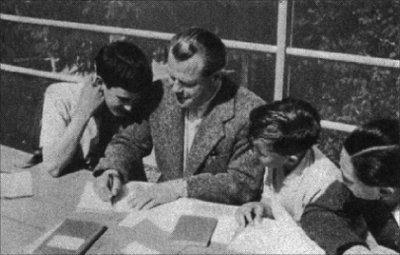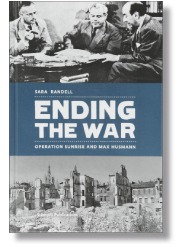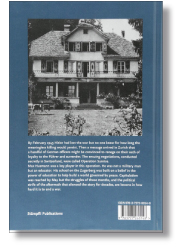Education in the service of peace
Education in the service of peace
To the book by Sara Randell “Ending the War — Operation Sunrise and Max Husmann”
by Dr phil. Winfried Pogorzelski
At the beginning of 1945, the Second World War came to a head: on all fronts in Europe, Asia and North Africa, the situation was hopeless for Hitler’s troops, as it was on the southern front in northern Italy. On 2 May 1945 at 6 p.m. – less than a week before Hitler Germany’s actual surrender – Winston Churchill announced that Army Group C of the German Wehrmacht had capitulated in northern Italy. This was due to intelligence activities known as “Operation Sunrise”, which have been the subject of several publications.1 Last year another book was published by Dr Sara Randell, historian at Oxford University, entitled “Ending the War – Operation Sunrise and Max Husmann”.2

Education and training for peace
Dr Max Husmann (1888-1965) was a pedagogue and founded the Institute Montana on the Zugerberg in 1926, an international school that still exists today with a boarding school, bilingual primary school, Swiss grammar school and the International School (High School, IB). He headed the school until 1946. I myself worked there from 1990 to 2017 as a grammar school teacher for German and history and witnessed how Sara Randell presented her book at the alumni meeting last summer.
As the title suggests, Max Husmann was not only active as a pedagogue; he was also significantly involved in the Operation Sunrise. The author’s main aim in her work is to show that Husmann, with his activities in the aforementioned secret service operation and his commitment as a school founder and active teacher, pursued his most important concern, namely to make a contribution to peace and international understanding. By founding the institute and intervening in the course of time in the form of the Operation Sunrise at the end of the Second World War, he put “his views on the ethics of war and peace into practice”.3
After the First World War, the worst of all wars up to that point in time, Husmann studied the question of how catastrophes of this magnitude could be prevented in the future. His pedagogical approach was to bring together students from different nations, to impart “respect for their fellow human beings and clear thinking” to “resist propaganda”.4 He attempted to achieve this aim with his pedagogical concept, which can be outlined as follows: Instruction in smaller, internationally mixed classes (ten to a maximum of twelve students), age-mixed cohabitation also outside lessons in the boarding school, with daily homework (“study”), sports and games, meals and excursions.
Operation Sunrise – a varied course and a happy ending
The course of Operation Sunrise can be summarised as follows:5 In spring of 1945, the war is lost for Germany on all fronts. The surrender of the armed forces is only a question of time, also in northern Italy, where destruction is threatening on the principle of the scorged earth by the German military. Husmann meets the Italian baron and businessman Luigi Parrilli, whose nephew was a student at the Institute and who has contacts to high-ranking SS people who are willing to surrender. Thereof Husmann informs his friend Max Waibel, the officer of the Swiss intelligence service. Waibel and Parrilli meet and negotiations begin that must remain absolutely secret. For one before the Federal Council because of the neutrality of Switzerland and also before the Allies, since according to a corresponding agreement between Churchill, Roosevelt and Stalin it was strictly forbidden to hold talks among each other without the knowledge or participation of the Russians. In addition, Berlin, in other words Hitler, was by no means allowed to learn about the attempts to convince high German military leaders to capitulate.
Max Waibel, who had been contacted by Husmann, turns to Allen Dulles, the envoy of the US secret service OSS in Berne at the time. Opposite him stands Karl Wolff, advisor to Hitler and Himmler, the highest SS and police leader in Italy, for whom the defeat of the Axis powers in Italy can no longer be averted and who promises mitigating circumstances for the time after the war if he advocates an earlier end to the fighting. This is where Max Husmann takes up the challenge by promising Wolff to put in a good word for him. It is also clear, however, that the capitulation of the Germans must take place unconditionally and it must not be speculated on “separating the Anglo-American allies from the Soviet allies and to fight Stalin in a united front.”6
Waibel and Husmann succeed in bringing Karl Wolff to Switzerland under the strictest secrecy. During the train journey accross the Swiss Alps, Wolff and Husmann talk for two hours in private behind closed curtains. Husmann sees a chance to convince Wolff of the point of a premature surrender. At first, however, Wolff takes the position that the “pillars of human existence” are “obedience and vows. We can die for them, but we cannot break them and continue to live.”7 According to Max Waibel’s notes, Husmann replies, with the words of Johann Heinrich Pestalozzi: “Does the principle of obedience forbid thinking?”8 According to this great Swiss pedagogue and writer, obedience means being freed from the constraints of one’s own selfishness and be able to follow one’s own conscience. According to Husmann towards Wolff, personalities in responsible positions should not carry out orders without contradiction and unconditionally, but reflect on them. Finally, Husmann succeeds in convincing Wolff that unconditional surrender is not a betrayal of the Führer, but a patriotic act for the German people. Later Wolff says that he had become aware that he had actually sworn his oath on the German people and not on Hitler.
The path from the first talks to the signing of the capitulation documents is not only rocky, but also complicated and sometimes confusing, as Sara Randell illustrates in her book.9 A variety of people of different origin and position were involved. The plot of this political thriller took place at various locations in Italy, Switzerland and Germany. More than once the operation was about to fail because of unexpected problems. Various difficulties have to be overcome, such as the transfer of Albert Kesselring, the supreme German army and air force officer who advocates Operation Sunrise, to the Western Front, or the fact that the Western Allies are now informing the Soviets about the operation … In addition, the Allies are launching a new offensive in Italy, where the soldiers were to be ordered to lay down their weapons. Wolff has quite a hard time convincing the generals with their “stubborn egos, with their fear of Hitler, but also with their unshakeable loyalty to the Führer.”10 Finally, on 2 May, after the news of Hitler’s suicide (30 April) had arrived, and only one week before Germany’s final surrender on 8 May, the weapons in Italy remain silent. Already since March, i.e. since the talks with Max Waibel, Wolff had renounced the planned and partly ordered destruction of industrial plants and traffic routes. Thus the important supply routes for Switzerland – ports and railway lines – were saved.
Max Husmann’s background – motivation for his commitment
The chapter “Learning Tolerance” is revealing, where the author gives an insight into Husmann’s biography in order to investigate the question of why the founder of the Montana Institute was committed with heart and soul to peace and international understanding. 1889 born in Ukraine into a family with Jewish roots that suffers under the Russification policy of Tsar Alexander II, he experiences the brutal consequences of nationalism and anti-Semitism. The family with roots in the Lucerne village of Malters emigrates to Zurich when Max is ten years old. From safe Switzerland the family and Max, who is now a student, witnessed a cruel suppression of the independence movement in Ukraine at the end of the First World War. For Husmann, who already as student gave private lessons – especially in mathematics – nothing would be more natural than to found a school to work towards a society that would find “ways other than bloodshed and battles”11 to solve its problems.
That is why he founded the Montana Institute, which he called his “dearest child”.12 According to the countries of origin of the students, he establishes different sections where they not only acquire “the academic qualifications of their home country”13 but also come to the conviction that “one must know and respect the values of the own country of birth. Only then one can appreciate those from other countries”.14 Together with one of the most important teachers of his school, Huldrich Sauerwein, Husmann may be understood as a representative of the reform pedagogy, whose aim it was to go beyond the mere teaching of subject material but to impart a kind of education that enables their students to cooperate in building a better world in the future. Sara Randell mentions the names of John Dewey, Georg Kerschensteiner, A. S. Neill, Rudolf Steiner and Maria Montessori, who in 1932, along with Sauerwein spoke to the League of Nations in Geneva about education and peace and who organised several peace conferences.
Husmann’s commitment to Karl Wolff at the Nuremberg Trials
Husmann is committed to Karl Wolff at the Nuremberg Trials: If a military capitulation and thus a shortening of warfare could be achieved, you might have to “sup with the devil”15 if necessary. Wolff had been promised loyal treatment after the war, “and so today we have no right not to keep our promise on the grounds that he was an SS General and the entire SS organisation was condemned as a criminal organisation”.16 In Nuremberg, Wolff appears as a witness only, probably also for the reason that the Allies want to prevent Operation Sunrise from becoming publicly known. In 1964, the Munich Regional Court sentences him to 15 years in prison for aiding and abetting the murder of 300,000 Jews. Thus, Max Husmann has to live with the fact that he stood up for the refraining from enforcement of arrest of one of the biggest war criminals of the Nazi era.
Aftermath of Operation Sunrise
Finally, the historian devotes herself to the aftermath of Operation Sunrise from the times of the cover-up right after the war, in which the role of Max Husmann was examined with a good deal of mistrust, to the rehabilitation in the 1960s. On 6 May 2002, the “Neue Zürcher Zeitung” published an article entitled “Den Krieg verkürzt” (The war shortened), which was a commemoration ceremony for Max Waibel. It was only in 2005, on the occasion of the 60th anniversary of Operation Sunrise, that official Switzerland recognised the importance of the operation. Samuel Schmid, then President of the Swiss Confederation, expressly appreciated Max Waibel’s actions and also “acknowledged the important role that Max Husmann had played”.17
Lessons from the past and for the future regarding peace
I was particularly impressed by the chapter titled “Politics and Peace” towards the end of the book, where Sara Randell quotes the Geneva philosopher Jean-Jacques Rousseau: “War is then not a relationship between one man and another, but a relationship between one state and another, not as men, nor even as citizens by accident.”18 The author then lets Max Husmann have his say: He saw his task in “shifting the sense of responsibility to the conscience of the individual appart from political duplicity”.19 She sums up: “It may be that one does not always act correctly. The challenging ethical considerations in connection with the trial against Karl Wolff show how difficult it is to distinguish between black and white. But the history of Operation Sunrise describes Max Husmann’s very human endeavour to find a way through the ambiguities of politics to achieve the real and ultimate goal: Peace.”20
Sara Randell’s richly illustrated book not only offers an extremely exciting read, centred on one of the most important epochs in history, but also reveals to the reader what kind of committed personality the founder of the Montana Institute was. His attitude to war and peace, his commitment as an educator and as a contemporary who actively intervenes in current affairs remains impressive and exemplary to this day. •
1 Dulles, Allen; from Schulze-Gaervernitz, Gero. Operation Sunrise, The secret history of the end of the war in Italy. Vienna 1967 Fuhrer, H.R., Orlansky, Michael. Pushers and Pushed. The ‘German participants’ and the early end of the war in Italy, 1945. In: Operation Sunrise. Atti del Convegno internazionale (Locarno, 2 maggio 2005), a cura di Marino Vigano e Dominic M. Pedrazzini, Lugano 2006
Halbrock, Stephen. Operation Sunrise: America’s OSS, Swiss Intelligence and the German Surrender 1945. In: Operation Sunrise. Atti del Convegno internazionale (Locarno, 2 maggio 2005), a cura di Marino Vigano e Dominic M. Pedrazzini, Lugano 2006
Waibel, Max. Operation Sunrise 1945 – Surrender in Northern Italy, original report by the mediator, Schaffhausen 1981
Den Krieg verkürzt.(War shortend) In: Neue Zürcher Zeitung of 6.5.2002
Ginsberg, Inge. Wie die Schweiz den Krieg verkürzte.(How Switzerland shortened the war) In: Weltwoche, 23.4.2015, ibid. p. 64, cf. also ibid. p. 104-107
2 Randell, Sara. Ending the War: Operation Sunrise and Max Husmann, Berne 2018.
The following references to pages correspond with the German edition of the book: “Den Krieg beenden – Die Operation Sunrise und Max Husmann”
3 cf. ibid., p. 8
4 ibid., p. 64, cf. also ibid. p. 104-107
5 Joseph Mächler also gives an informative overview of the operation in his book “Wie sich die Schweiz rettete, Grundlagenbuch zur Geschichte der Schweiz im Zweiten Weltkrieg” (“How Switzerland saved itself, Basic Book on the History of Switzerland in the Second World War”), Zollikofen 2017, pp. 480-484
6 Randell, Sara, op. cit., p. 29
7 ibid., p. 61
8 ibid., p. 62
9 A chronology of events and a list of persons would be helpful.
10 ibid., p. 83
11 ibid., p. 61
12 ibid.
13 ibid., p. 105
14 ibid., pp. 105
15 ibid., p. 96
16 ibid.
17 ibid., p. 116
18 ibid., p. 117
19 ibid.
20 ibid.
(Translation Current Concerns)

